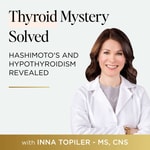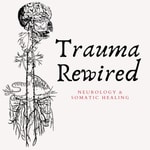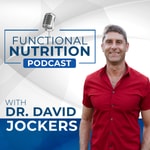Thyroid Mystery Solved: Hashimoto's and Hypothyroidism Revealed – Details, episodes & analysis
Podcast details
Technical and general information from the podcast's RSS feed.

Thyroid Mystery Solved: Hashimoto's and Hypothyroidism Revealed
Inna Topiler
Frequency: 1 episode/12d. Total Eps: 199

Recent rankings
Latest chart positions across Apple Podcasts and Spotify rankings.
Apple Podcasts
🇺🇸 USA - alternativeHealth
30/07/2025#81🇨🇦 Canada - alternativeHealth
28/07/2025#100🇨🇦 Canada - alternativeHealth
27/07/2025#56🇺🇸 USA - alternativeHealth
27/07/2025#98🇺🇸 USA - alternativeHealth
26/07/2025#89🇺🇸 USA - alternativeHealth
19/07/2025#85🇺🇸 USA - alternativeHealth
18/07/2025#79🇺🇸 USA - alternativeHealth
17/07/2025#90🇫🇷 France - alternativeHealth
17/07/2025#70🇺🇸 USA - alternativeHealth
16/07/2025#79
Spotify
No recent rankings available
Shared links between episodes and podcasts
Links found in episode descriptions and other podcasts that share them.
See all- https://thyrolove.com/
500 shares
- https://innatopiler.com/zoomcall/
496 shares
- https://protectnaturenow.com/
141 shares
RSS feed quality and score
Technical evaluation of the podcast's RSS feed quality and structure.
See allScore global : 63%
Publication history
Monthly episode publishing history over the past years.
172 Solving the SIBO Mystery in Hashimoto's Patients
jeudi 18 juillet 2024 • Duration 24:19
Subscribe to Thyrolove and Save 15%
https://thyrolove.com/
ANNOUNCEMENT:
We'll be taking a break from the podcast for the month of August and be back with more amazing content in September. Enjoy the rest of your summer! Catchup on past episode here: https://innatopiler.com/podcast/
Inna Topiler Reveals the Root Causes of SIBO in Hashimoto’s Patients and How to Address Them
Jump to the FULL SHOW NOTES HERE:
The Case:
- Emily has Hashimoto’s and is experiencing weight gain, constant bloating, and skin problems.
- She suspected that SIBO (Small Intestinal Bacterial Overgrowth) was the root of her problems.
- A gastroenterologist prescribed an antibiotic for SIBO which worked until she stopped taking it.
Emily was frustrated to have her symptoms return after the prescribed course of antibiotics ended. She was desperate for a solution, and that’s when she came to see me.
Press play to find out how we helped her control the bloating and help her lose weight.
Subscribe to Thyrolove and Save 15%
https://thyrolove.com/
171 From Overwhelmed to Energized: Hashimoto’s Transformation with Beth Mosher
jeudi 4 juillet 2024 • Duration 44:14
Subscribe to Thyrolove and Save 15%
https://thyrolove.com/
It Feels Like You’re Handling Stress but Your Body Tells a Different Story
Jump to the FULL SHOW NOTES HERE:
The Case:
- Judy is a super busy mom successfully juggling family and her career on Wall Street
- Suddenly she started to feel tired all the time. When time off didn’t help, a doctor diagnosed her with Hashimoto’s.
- Doctors told her to take medication and continue to rest but it didn’t work.
Judy’s is such a common case. So many conventional doctors don’t do much more than tell the patient to rest and let the medication get to work. But, when it doesn’t - and you’re used to being unstoppable - the outlook becomes unacceptable.
This was the case for Judy. The medication didn’t seem to help. She found herself struggling with simple tasks, unable to spend quality time with her kids, and feeling like life was passing her by. That’s when I met Judy and I knew we needed to dig deeper to solve her health mystery.
So what is the Role of the Immune System in Hashimoto's?
To help me unravel Judy's complex symptoms, I invited Beth Mosher to join the conversation. Beth is a brilliant board-certified nutrition specialist and has worked with me in my practice for 13 years. Together, we’ve been solving various thyroid and health mysteries.
Press play to find out:
How Does Stress Impact Hashimoto’s?
and
What Are the Best Ways to Manage Stress and Promote Healing in Hashimoto's?
Subscribe to Thyrolove and Save 15%
https://thyrolove.com/
162 Happy Mouth, Healthy Thyroid: The Surprising Connection to Hashimoto’s with Dr. John Augspurger
jeudi 29 février 2024 • Duration 50:34
Subscribe to Thyrolove and Save 15%
https://thyrolove.com/
Jump to the FULL Episode Show Notes here:
https://healthmysteriessolved.com/162-happy-mouth-healthy-thyroid-the-surprising-connection-to-hashimotos
The Case:
Kari has Hashimoto’s and hypothyroidism and feels very inflamed.
- She tried going gluten-free but didn’t notice much improvement.
- She knew something else was going on but couldn’t find any answers.
I met Kari inside my Thyroid Mystery Solved program and wanted to investigate what was going on. After reviewing her case, I noticed that she has had a fair amount of dental work including silver fillings, a root canal, and recent tooth extractions.
Her dentist was giving her a clean bill of health but I suspected the answers to her mystery might be in her mouth.
The Investigation
Our oral health has a lot more impact on our overall health than most of us realize. I knew that if there was one person who could shed some light on Kari’s case it would be Dr. John Augspurger. He’s the founder of Biodentist and co-founder of HUH Institute. He’s studied with some of the most renowned dentists and is a teacher as well. His approach is vastly different from traditional dentists so I was excited to talk to him about the impact of Hashimoto’s on dental health.
The Overlooked Significance of Oral Health
Many of us understand the importance of gut health in maintaining overall wellness, but what about the mouth? The mouth serves as the gateway to our digestive system, making it a vital starting point for our overall health journey. Dr. Augspurger highlighted the significance of creating optimal conditions within the mouth to support a healthy microbial environment. Just as we nurture our gut microbiome, we must also cultivate a favorable habitat for beneficial bacteria in our mouths. This balance is essential for promoting proper digestion and overall well-being.
Dr. Augspurger emphasized the importance of maintaining an ideal pH balance in the mouth, noting that slight acidity is necessary for effective digestion. However, deviations from this balance can disrupt the delicate ecosystem of our oral microbiome, paving the way for harmful bacteria to thrive. This may become apparent with bad breath, tooth sensitivity, and even tooth pain. Factors such as stagnation and oxygen deprivation further exacerbate the risk of dental issues, underscoring the need for proactive oral care strategies.
Understanding How Oral Infections and Toxicity Impact the Thyroid
Given how important oral health is to our overall health, I wanted to know more about the intricate relationship between oral health and thyroid conditions, particularly Hashimoto's. Dr. Augspurger explained that the mouth serves as a gateway to overall wellness, with infections and toxicity playing pivotal roles in influencing thyroid health.
For example, infections can play a significant role in exacerbating autoimmune disorders like Hashimoto's. Dr. Augspurger highlighted the prevalence of infections within the oral cavity, ranging from common cavities to more insidious conditions like cavitations.
Cavitations, often overlooked in traditional dentistry, represent a serious concern for individuals grappling with thyroid issues. These hollow spaces within the jawbone, typically arising after tooth extractions, disrupt the natural healing process, leading to stagnation and chronic inflammation. Despite their stealthy nature, cavitations can wreak havoc on thyroid health, underscoring the importance of proactive dental care.
Avoiding Cavitations for Optimal Well-Being
Dr. Augspurger emphasized the importance of proactive measures during tooth extractions to mitigate the risk of cavitation formation. He explains the hallmarks of biologically-based dentistry including the meticulous removal of ligaments post-extraction and the use of a patient’s own platelets that accelerated healing. He also injects ozone into the platelets to further reduce the risk of infection.
Another important factor in reducing the chances of cavitations is to ensure that the ligament is fully removed along with the tooth. When it is, Dr. Augsburger explains, the healing process is quicker and pain-free. Plus, it reduces the chance of infection (because food and bacteria can’t get in). Because this approach is often not an option with traditional dentists, you’d have to find a dentist who prioritizes overall well-being and safeguards against cavitations with a biological dentistry approach.
Identifying Cavitations: Navigating the Diagnostic Maze
One of the challenges individuals face is identifying and addressing cavitations effectively. Unlike visible cavities that prompt immediate dental intervention, cavitations often evade detection without specialized diagnostic techniques. And, there is often no evidence of an infection. Most people experiencing inflammation and thyroid issues wouldn’t think to look for cavitations.
For many of us, myself included, the journey often begins with routine tooth extractions, whether it’s your wisdom teeth or other problematic molars. However, most of us don’t think about what may have been left behind (and the impact it can have on our health) after the extraction point has healed up.
Detecting cavitations from a previous extraction requires advanced diagnostic tools, such as three-dimensional X-rays. Dr. Augspurger explains that these cutting-edge imaging techniques offer a comprehensive view of the jawbone's integrity, revealing hidden anomalies that traditional methods might overlook. Again, a traditional dentist may not be able to detect cavitations with a standard X-ray machine.
How to Treat a Cavitation and Reverse Negative Side Effects
Once cavitations are identified, the next step is crafting a personalized treatment plan rooted in the principles of biological dentistry. This may mean that a dentist needs to open up the site of the original extraction to access the cavitation. They may be surprised to find what Dr. Augspurger calls an ‘oil slick’, I’ve heard described as green stuff. This is how hard the immune system is working to try to deal with the left-behind ligament or connective tissue debris. The only solution is to scrape it all out and then heal it properly using platelets infused with ozone to fill the hole.
This approach prioritizes holistic wellness over symptom management, empowering patients to reclaim their oral health with confidence. As patients, we have to advocate for our own well-being and that includes demanding a thorough investigation into the role our hidden oral health issues may impact our overall wellness.
Are Root Canals a Hidden Health Risk?
Root canals are often hailed as a saving grace for troubled teeth but Dr. Augspurger says that they pose a potential health risk in the long run. He explains that a root canal is the removal of the nerve and blood supply from within a tooth, making it a dead tooth. This alleviates the pain being caused by the tooth but it poses a new problem because the body isn’t set up to support dead body parts. He explains that when other part...
BONUS: Baby Is here – Meet Juliette –
mercredi 16 septembre 2020 • Duration 06:45
Subscribe to Thyrolove and Save 15%
https://thyrolove.com/
Hey Everyone!
I'm so excited to announce that baby girl Juliette has finally arrived!
She was born on Sept 2nd weighing in at 8 pounds. It was a bit rough getting her here but she is here safe and sound and we are doing great! I tell you all about it in this short episode. I also shared some pictures on my Instagram, I am @InnaTopiler (https://www.instagram.com/innatopiler/) so be sure to follow me there so we can connect.
We are all doing great and spending some quality family time together.
I am excited to be back with new episodes starting tomorrow, I have a ton of amazing interviews and content to share so be sure to stay tuned!!
Subscribe to Thyrolove and Save 15%
https://thyrolove.com/
BONUS: Quick Podcast Update
jeudi 20 août 2020 • Duration 03:55
Subscribe to Thyrolove and Save 15%
https://thyrolove.com/
**Show Announcement** As many of you may already know, I'm expecting a baby girl and she is due any day now. I have been super busy trying to get the last of my patients in before my maternity leave starts, cutting it really close here! The show is taking a short break so that I can focus on our growing family. But, don't worry - we'll be back on Sept. 17th, 2020. I've recorded this bonus episode to share a little bit more with you guys. And watch for the next bonus episode when I plan to introduce you to my baby girl. When we return in September, I'm excited to share some really inspiring cases and eye-opening interviews when. We'll be talking about thyroid eye disease, alkalinity from a different perspective, histamines, candida and I will also be sharing some of my products and protocols because so many of you have been asking me what I eat and what I use so I am doing an episode on that as well. In the meantime, this might be a good time for you to catch up on past shows that you may have missed! Listen on your favorite podcast app or at https://healthmysteriessolved.com And remember, when it comes to your health issues, please don't give up! The answers are out there and there is HOPE!
Subscribe to Thyrolove and Save 15%
https://thyrolove.com/
072 Could Glyphosate be Causing Gluten Intolerance?
jeudi 13 août 2020 • Duration 11:18
Subscribe to Thyrolove and Save 15%
https://thyrolove.com/
The Investigation
Gluten intolerance is an issue for a lot of people. As we explored in episode 066, it can cause a wide range of symptoms including fatigue, bloating, skin irritations, and migraines. For some people, gluten may seem like the root cause, but it could actually be something else. In this episode, we examine a chemical closely tied to wheat that could be the real issue.
Root Cause of Gluten Intolerance in America
Ever wonder why wheat seems to give people so many issues in this country? While gluten certainly plays a huge role, the question we are often asked is why people who are so sensitive to wheat in the US seem ok with it when traveling to other countries. It has been said that the genetic modification of wheat and hybridization plays a big role and while that is true, the new hybrid wheat has spread all over the world so it’s no longer specifically concentrated here in the US. So what is the issue?
There was a wonderful article in The Healthy Economist titled The Real Reason Wheat is Toxic.
The article points out that, believe it or not, it is actually a common wheat harvest protocol in the United States to drench the wheat fields with Roundup several days before the combine harvesters work through the fields as the practice allows for an earlier, easier and bigger harvest.
“Pre-harvest application of the herbicide Roundup or other herbicides containing the deadly active ingredient glyphosate to wheat and barley as a desiccant was suggested as early as 1980. It has since become routine over the past 15 years and is used as a drying agent 7-10 days before harvest within the conventional farming community.”
According to Dr. Stephanie Seneff of MIT who has studied the issue in depth, desiccating non-organic wheat crops with glyphosate just before harvest came into vogue late in the 90s with the result that most of the non-organic wheat in the United States is now contaminated with it. Seneff explains that when you expose wheat to a toxic chemical like glyphosate, it actually releases more seeds resulting in a slightly greater yield: “It ‘goes to seed’ as it dies. At its last gasp, it releases the seed” says Dr. Seneff.”
The article goes on to explain that while the herbicide industry tells us glyphosate is supposedly non toxic, there are multiple studies showing its effects on the cytochrome P450 system (which is the pathway our liver uses to detoxify). Just because it doesn’t kill us instantly, certainly does not mean it's non-toxic and that doesn’t have serious and long term effects.
Roundup disrupts the balance of healthy bacteria in the gut which then leads to intestinal permeability which is the breeding ground for autoimmunity. In fact, since roundup has been introduced in this practice in the 90’s, the amounts used have skyrocketed. Interestingly, celiac disease has as well. There is a very interesting study from December, 2013 connecting glyphosate in Roundup to many of the things that are thought to be celiac symptoms. Specifically, the abstract of the study (published by Interdisciplinary Toxicology) reads:
“Celiac disease is associated with imbalances in gut bacteria that can be fully explained by the known effects of glyphosate on gut bacteria. Characteristics of celiac disease point to impairment in many cytochrome P450 enzymes, which are involved with detoxifying environmental toxins, activating vitamin D3, catabolizing vitamin A, and maintaining bile acid production and sulfate supplies to the gut. Glyphosate is known to inhibit cytochrome P450 enzymes. Deficiencies in iron, cobalt, molybdenum, copper and other rare metals associated with celiac disease can be attributed to glyphosate's strong ability to chelate these elements. Deficiencies in tryptophan, tyrosine, methionine and selenomethionine associated with celiac disease match glyphosate's known depletion of these amino acids. ”
Furthermore, this exposure happens a little at a time over years which slowly damages the cells contributing to high levels of inflammation and inflammation is linked to a myriad of diseases. This can lead to a perfect storm where things are just enough ‘off balance’ that the body is not able to self correct, leading to chronic disease.
Banned in Other Countries
While Roundup and the use of Glyphosate is legal in the United States, countries around the world are labeling it a toxic chemical that is carcinogenic and banning it. For example, Australia, Luxembourg, France, Denmark, Holland, Portugal, and some cities in Spain have all banned it or are in the process of banning it. This may explain why you can eat wheat in other countries and feel fine but not at home.
Eliminating Health Mysteries
You don’t have to travel to another country to experiment with glyphosate-free wheat. You can try organic wheat sold in the US to find out if you feel better than eating genetically modified wheat. Imagine if all of the health issues you’ve assumed were related to gluten intolerance were actually related to glyphosate!
Links:
Related Podcast Episodes:
Could You be Gluten Sensitive Even if you Tested Negative? Demystifying Food Sensitivities (and What You Can do About Them)
Thanks for Listening
If you like what you heard, please rate and review this podcast. Every piece of feedback not only helps me create better shows, it helps more people find this important information.
Never miss an episode - Subscribe NOW to Health Mysteries Solved with host, Inna Topiler on Apple Podcasts, Spotify, Stitcher or Google Podcasts and remember to rate and review the show!
Find out more at http://healthmysteriessolved.com
PLEASE NOTE
All information, content, and material on this podcast is for informational purposes only and is not intended to serve as a substitute for the consultation, diagnosis, and/or medical treatment of a qualified physician or healthcare provider.
Some of the links provided are affiliate links. This means we may make a very small amount of money should you choose to buy after clicking on them. This will in no way affect the price of the product but it helps us a tiny bit in covering our expenses.
Subscribe to Thyrolove and Save 15%
https://thyrolove.com/
071 The Dangers of Ignoring your Mouth’s Microbiome w/ Dr. Kourosh Maddahi, DDS
jeudi 6 août 2020 • Duration 38:58
Subscribe to Thyrolove and Save 15%
https://thyrolove.com/
In our last episode, we met Emily who was dealing with fatigue, brain fog, dry mouth, bad breath and problems with her gut health. We discovered that the root cause of her health issues was in her mouth - namely that she was suffering from undetected infections and was experiencing Mercury leaching from her silver amalgam fillings. Dealing with this root cause carefully while supporting her immune health resulted in a massive improvement in her day-to-day well-being. Plus, she even reduced her Hashimoto’s antibodies significantly!
If you missed that surprising episode - listen to it here.
The Investigation
Helping me out with the last case was dentist to the stars, Dr. Kourosh Maddahi. Our conversation went well beyond the dangers of mercury fillings and hidden dental infections. We also talked in depth about the importance of paying attention to the microbiome of your mouth (yes, your mouth - it’s not just your gut that has a microbiome!) That conversation was so important that I wanted to make sure to share it with you. So, this week, we are continuing our conversation about obtaining optimal dental health to support your overall well-being.
How Food Impacts our Dental Health
Most of us know that sugar can cause tooth decay, but Dr. Maddahi says that our diet has a bigger impact on our oral health than this. He believes that pesticides we ingest (when we are not eating organic food, for example) can seriously impact our mouth’s natural biome.
The Microbiome of the Mouth
When people hear ‘microbiome’ chances are their thoughts go to the gut. It’s what we talk about the most! But, your body has other biomes including a delicate one in the mouth. And, like the one in your gut, the mouth needs both good and bad bacteria to balance out to optimal. Dr. Maddahi says that the mouth’s microbiome has been under attack with the increasing focus on eradicating all bacteria in the mouth. Mouthwashes, sprays, toothpastes all promote being anti-bacteria (usually in their promise to get rid of bad breath). However, these products don’t just kill the bad bacteria, they kill the good bacteria too, leaving the cells in the mouth unprotected and the mouth’s microbiome in an unhealthy state.
In addition, the body requires certain bacteria to stimulate the creation of certain vitamins. For example, it’s required for the production of Vitamin K. Without proper levels of vitamin K, blood may not coagulate properly.
Digestion Starts in the Mouth
When we think about digestive issues, we don’t often think about where the process starts. In order to digest our food properly, we have to first chew it properly. We also need a healthy mouth biome for the food to start breaking down. The gut has 144 strains of microbiome and about half of those are also found in the mouth. So, the process of digesting our food really does start in the mouth.
Dry Mouth Can Cause Big Problems
Saliva is a part of the defense mechanism in the mouth as a natural antibiotic. It plays a role in maintaining a healthy microbiome. However, there are over 450 medications that cause dry mouth. This is more than a discomfort. Dry mouth increases the chances of cavities. Without sufficient saliva, these cavities can develop very quickly - even with good oral hygiene.
Maintaining Healthy Microbiome in the Mouth
Ninety-eight percent of the bacteria in your mouth is good bacteria. However, that percentage can fluctuate when bad bacteria spikes. These spikes are caused by things like eating sugar, nutrition, not cleaning the mouth regularly and allowing plaque to harden on the teeth. The fear of bad mouth bacteria causes some people to reach for an antiseptic mouthwash. While these products do kill the 2% of bad bacteria, they also kill off the 98% of bacteria that’s good - the bacteria that’s protecting your mouth (and your gut). It’s much better to avoid sugar, toxins, and practice good dental hygiene to control the bad bacteria.
Brushing Your Teeth Properly
Brushing and flossing regularly is key to removing plaque before it can harden on the teeth. However, Dr. Maddahi says that most people are doing it wrong. In fact, he says improper brushing or use of the wrong kind of toothbrush causes 50% of the recessive gums he sees in his practice. Toothbrushes should have soft bristles otherwise, it will damage the gums. He also says that you should not be scrubbing your teeth or going back and forth with the brush because it can damage the gums and remove important tooth enamel. Instead, he recommends holding the toothbrush at a 45°, starting at the gum level and brushing down (or up for the bottom teeth) followed by a very gentle circular motion to remove plaque.
If using an electric toothbrush, don’t use it the same way you would a manual toothbrush; let the mechanics do the work instead.
Select a Non-Toxic Toothpaste
Dr. Maddahi says that it’s important to select a toothpaste that is not going to disrupt the balance of your mouth’s microbiome and that is not going to introduce toxins. He has developed a dental care product line that naturally neutralizes the toxins and bad bacteria without destroying the good bacteria. Dr. Maddahi has created a natural tooth-care product line called Oral Essentials that he says is proven effective in 51 clinical research studies. There are a variety of products including one for whitening (without the enamel damaging peroxide) and one for kids.
Conclusion
After my conversation with Dr. Maddahi, I changed the way I brushed my teeth and was inspired to try the Oral Essentials. We can’t take our teeth for granted but there is so much more to caring for them than just making sure they are sparkling white. Since the mouth is the gateway to our guts, how well we take care of it will directly affect our gut-health which we know is so central to good health.
Eliminating Health Mysteries
Could a simple change to your oral health practices have a big impact on your overall health? There are so many health mysteries that could be caused by the microbiome in the mouth. Could this be the missing clue for you or someone in your life?
Links:
Resources mentioned
Thanks to my guest, Dr. Kourosh Maddahi. You can connect with him through his website or on Instagram. You can also check out his line of natural dental care products - Oral Essentials here and make sure you use the promo code INNA15 to save 15%!
Suggested Products
OralEssentials.com (save 15% with promo code: INNA15)
Related Podcast Episodes:
The Case of Mercury Fillings w/ Dr. Kourosh Maddahi
The Case of Tooth Pain Causing Fatigue with Naturopath Dr. Christine Shaffner
Thanks for Listening
If you like what you heard, please rate and review this podcast. Every piece of feedback not only helps me create better shows, it helps more people find this important information.
Never miss an episode - Subscribe NOW to Health Mysteries Solved with host, Inna Topiler on
070 The Case of Mercury Fillings w/ Dr. Kourosh Maddahi
jeudi 30 juillet 2020 • Duration 45:02
Subscribe to Thyrolove and Save 15%
https://thyrolove.com/
The Case:
- Emily is 45 dealing with fatigue, brain fog and digestive issues as well as dry mouth and bad breath.
- Her doctor’s diagnosed her with Crohn’s Disease and Hashimoto’s but that alone didn’t help her symptoms.
- She tried changing her diet, took supplements and brushed her teeth after every meal.
The Investigation
My investigation started by looking into Emily’s dry mouth and bad breath. Her oral health was quite poor despite frequent brushing and I noted that she’d had several root canals and many silver fillings. I know this was going to be a key piece in solving her health mystery because even though these may not seem related, everything in the body is connected.
“Silver fillings” or Amalgam fillings are actually about 54% elemental mercury and mercury can cause all kinds of health issues. On top of that, our oral health can seriously impact our overall health, even when we think we are practicing good oral hygiene.
Dr. Kourosh Maddahi is a dentist to the stars, the author of 'Anti-Aging Dentistry' and the founder of the research-based Lumineux Oral Essentials. He joins me in this episode to shed some light on what might be going on with Emily.
Your Mouth is a Gateway to Your Body
The mouth is the first entry point for the digestive system with regards to disease or infection. The mouth is the most vascular area which means that it is easy for bad bacteria and viruses to be transmitted through the mouth vascularly as well as by swallowing.
We know that chronic inflammation is a key component in many diseases and the mouth is also susceptible to inflammation. Gingivitis, for example, is chronic inflammation of the gums. This inflammation can increase the chances of transmitting disease because swollen gums are more likely to have tiny cuts (and bleed) which removes the barrier between bad bacteria or viruses and the bloodstream.
Signs of Inflammation in the Mouth
The first and most common sign of acute or chronic inflammation is bleeding during or after teeth-brushing. A second sign is if there is discomfort when eating, especially if there is pain when biting or chewing. Pain during eating can be a sign that there is an infection under the tooth, in the gums, or in the bone. Dentists can do X-rays and probe the gums to confirm chronic inflammation and/or a suspected infection.
Causes of Inflammation in the Mouth & How to Avoid It
Inflammation can happen quickly. For example, Dr. Maddahi says that a build up of hardened plaque causes inflammation and plaque can harden on your teeth within 24 hours. That’s why brushing frequently is so important. He says the simplest way to avoid inflammation is to remove plaque before it can harden - in other words, floss and brush regularly and see your dentist to remove hardened plaque every 6-months.
Health Risks from Silver Fillings (Amalgam Fillings)
Silver fillings contain mercury which is known to cause health issues. Mercury exists in three forms: solid, liquid, and vapor. The vapor form is the greatest concern in the mouth because it can leach out when we are chewing or drinking hot liquids and enter various tissues and organs. Of particular concern is that mercury vapor can break the blood-brain barrier and the half-life of mercury in the brain is 20-years. As mercury accumulates in organs, it can reach toxic levels. Mercury toxicity can impact the nervous, digestive and immune systems. It can also negatively affect the development of children in utero and in early life.
Testing for Mercury Toxicity
Common practice is to test your hair and urine to determine mercury levels in the body. However, Dr. Maddahi says this is not a true indication because the mercury could be absorbed in the tissues and organs. Instead, he suggests doing a challenge test.
Should You Remove Mercury Fillings?
This is a controversial question for a lot of dentists and health experts. While it may seem like an obvious solution, given the leaching of mercury vapors into our system, the drilling and removal of silver amalgam fillings can cause a significant release of vapors - as much as 100 times more than the you might experience by not removing them - during a very short time period. If the patient is healthy and doing the removal as a precaution, then Dr. Maddahi suggests only doing one quadrant at a time.
Safety During the Removal of Mercury Fillings
Anyone choosing to remove mercury fillings should select a dentist who will take the greatest precautions to reduce the potential exposure to mercury vapors. For example, the patient should be on oxygen so that they are breathing through their nose and not through their mouth during the removal. There should also be a vacuum to capture the filings and aerosol caused by the drilling. And, Dr. Maddahi also gives patients an activated charcoal rinse to coat the gums and stomach which reduces the chances of mercury being absorbed.
What is Biocompatibility Dentistry?
Biocompatibility Dentistry is the matching of dental products to the individual based on sensitivities they may unknowingly have. This process involves doing a Clifford Test prior to dental work that tests the patient’s blood for incapability issues they may have to certain (commonly used) dental materials. This is really important because without it, a patient may get a crown or a veneer using materials they are incompatible with and constantly have issues with and around that tooth (including discoloration, inflammation, pain, and bleeding).
Detecting Infections in Teeth and the Mouth
Aside from mercury fillings, there is another hidden dental issue that can impact overall health - infected teeth or bones in the mouth. Infections can happen inside teeth - especially in the case of a poorly-done root canal. Dr. Maddahi says that these infections have been linked to immunity issues. Detecting this kind of infection can be done using an X-ray or, in some cases, a cone beam scan. Another source of infection is through cavitations in the bone caused by the removal of a tooth. A scan can also help with detecting this.
Mystery Solved
The first step in solving Emily’s health mystery was for her to see a biological dentist and get some good scans to determine if infections or cavitations may be the culprit. And, to discuss whether removing her silver amalgam fillings might be beneficial. This visit revealed a lot!
While she worked closely with this dentist to address all those issues, I supported her detox pathways with glutathione and binders to make sure she was not absorbing any of the toxins that were being removed from her mouth.
Emily and her dentist took the removal of her silver fillings slow to ensure her body could detox and adjust. She had 10 fillings changed over and had one tooth pulled (a previous root canal had become infected) over the course of 3 months. In that time, she had no detox reactions and noticed an improvement in her energy and brain fog when all the dental work was done.
While doing the dental work, we also began a cleanse with anti-microbial herbs to deal with several infections that we detected through a stool test. ...
069 [Ask Inna] More Answers to Your Hashimoto’s Questions (Part 2)
jeudi 23 juillet 2020 • Duration 28:52
Subscribe to Thyrolove and Save 15%
https://thyrolove.com/
Last week I shared some of the questions you wanted answered about Hashimoto’s. I covered topics like the relationship between heavy metals and Hashimoto’s, the role the adrenals play in Hashimoto’s, the relationship between Epstein-Barr Virus (EBV) and Hashimoto’s and how to reduce the risk for kids of people with Hashimoto’s. All of them were very important questions that have a lot to do with the triggers of Hashimoto’s. If you missed it, here is a link to episode 068.
In this episode, I answer more of your questions about Hashimoto’s.
Question #1: With Hashimoto’s, is TSH a reliable indicator of the body’s thyroid hormone needs? If not, what else can we use to know what the body needs?
This can be very confusing for anyone with Hashimoto’s. The short answer is, no. TSH is not a reliable indicator. The ranges for TSH are very broad (typically between about 4.5 - 5 depending on where you live. This range is not really optimal. The optimal range for TSH is between 1.8-3 (if you’re on thyroid medication this shifts a bit).
But, TSH is only one indicator and you need to look at the big picture including your total T4, free T4, total T3, free T3, and reverse T3. This is because TSH is not actually created in the thyroid - it's the thyroid stimulating hormone created in the pituitary gland. So, only looking at TSH doesn’t tell us which hormones the thyroid is producing and at which ratio. And, it doesn’t tell us how well the body (primarily the liver and the gut) are converting these hormones or how the hormones are actually utilized. Essentially, TSH shows a very very small part of a much bigger picture and that is why its not nearly complete. With Hashimoto’s you also want to track your antibody levels so that you can determine which triggers (listen to episode 068 for more on the four triggers) are affecting you and your levels.
I’ve listed the various tests I recommend to get the whole picture of your thyroid functionality and optimal levels for each in the show notes for episode 027. If you are looking for a lab to do these tests, here is a link to a helpful resource and lab.
I’m in the process of creating my thyroid course which is going to get way more in depth about this and how you can figure out your pattern and exactly what to do about it. The course will launch this fall. Add your name to the wait list if you’d like to be personally invited to join.
Question #2: Why does someone with Hashimoto's feel tired all day long? How can we help this and what can we do to wake up feeling refreshed and have more energy throughout the day?
While Hashimoto’s is an issue, we need to look at the root cause of the fatigue. It’s true that Hashimoto’s causes the immune system to attack the thyroid and often causes hypothyroidism which has a common symptom of fatigue. So, the first step is to make sure that you are supporting thyroid function optimally with what your body needs (foods, supplements or if necessary thyroid medication that is dosed appropriately) and you are also by avoiding Hashimoto triggers (noted in last week’s episode).
If you are doing these things and continue to feel tired, then you may want to consider the role your adrenal glands may be playing in your fatigue. The adrenals and the thyroid are very interrelated. Stress is a key trigger for Hashimoto’s and it can also impact adrenal function.
Clean eating is also recommended but if you continue to feel tired, you may be having some issues with absorption which could be caused by a gut issue. This could be the real cause of the fatigue as well
And finally, check that you are not deficient in nutrients that help us feel more energized like iron, B12 and other B vitamins. As you can see, feeling tired is quite multi faceted so we have to look at it from all angles.
Question #3: My diagnosis of Hashimoto's only came after being on thyroid medication for years. Can this medication be contributing to Hashimoto's?
In my opinion, I don’t think it did. What often happens is that the Hashimoto’s is undiagnosed for many years. Conventional doctors will often stop looking for answers once they diagnose hypothyroidism. So, the Hashimoto’s may have been there or been developing all along. I don’t think that the medication could cause Hashimoto’s because whether you’re taking a synthetic hormone or a natural, desiccated hormone, you’re just replacing the hormone that the body is failing to produce. One thing that could be setting off the immune system is a sensitivity to corn. Some medications are made with cornstarch so a small amount, everyday could be causing a reaction from the immune system so that is something to look into and perhaps change to a compounded medication with no fillers can help.
Question #4: Do you have to eat after taking Levothyroxine? And, can it be taken when doing a water-fast?
Levothyroxine or L-thyroxine is a T4 medication prescribed to some people with low thyroid function. It is meant to be taken on an empty stomach and you don’t need food later to help it absorb. So, in the case of a water-fast, it should not impact the effectiveness. However, water-fasts should be done under the guidance of a health practitioner so make sure they know you’re taking Levothyroxine.
Question #5: How can you lose (or gain) weight when you have Hashimoto’s
I had multiple people ask me about this - both people looking to lose weight and people struggling to maintain or gain weight.
We know that the thyroid has a big effect on metabolism. Once again, it’s important to look at the full hormone picture (not just TSH levels) to determine if the thyroid is not functioning optimally. If everything looks good, then the next place to look is at the food you’re eating - specifically any foods that you may have a sensitivity to. Food sensitivities can cause inflammation resulting in water weight gain. Hormonal imbalances may also be impacting the metabolism.
The other big thing to consider is your metabolic type. We have different metabolic types, some people are protein or fat types and some are carb types. The protein types tend to do better with higher protein and fat whereas the carb types tend to do better with some carbs and less fat. If you are eating counter to your type (even if it’s super healthy) you may struggle to lose or gain weight. Also if you combine too much fat with too many carbs (even if they are good fats and good carbs) that tends to have a negative effect on our metabolism. While calories are not everything, how we combine our food does make a big difference.
For anyone struggling to maintain their weight or gain weight the first thing to check is that you’re not over medicated or over-supplemented. Next, watch for triggers that may be causing Hashimoto’s flare ups. These can send your thyroid into hyper mode and then drop back down to hypo mode. And, like the weight loss issue, make sure you are eating for your metabolic type and for you, combining good carbs with good fats would in this case be a good thing.
Quest...
068 [Ask Inna] Answers to All Your Hashimoto’s Questions
jeudi 16 juillet 2020 • Duration 24:37
Subscribe to Thyrolove and Save 15%
https://thyrolove.com/
I asked what you wanted to know about Hashimoto’s and the questions came flying in! In this episode, I’m going to tackle half of them and tune in next week as well because I’ll answer the rest there!
Hashimoto’s disease is an autoimmune disease that affects the thyroid. Like other autoimmune diseases, what happens is that the immune system gets confused and starts to see the thyroid as a threat. In other autoimmune diseases, the system attacks a different part of the body (the myelin sheath with MS, joints with rheumatoid arthritis, connective tissue with lupus). Under this attack, the thyroid can’t perform optimally and the result is often hypothyroidism.
Conventional medicine treats Hashimoto’s by only addressing the hypothyroidism if present or waiting for hypothyroidism to begin or suppressing the immune system with medication. The functional medicine approach is to find the root cause of the Hashimoto’s and fix it. I support the functional medicine approach and it starts by understanding what’s going on first. Which is why, I’m so happy to answer your questions!
Autoimmune Triggers
There are four main triggers that can get the immune system in a tizzy. Here are the key triggers for autoimmune diseases:
- Food
Individuals may have food sensitivities, or lack the proper enzymes or stomach bile to properly digest food. If the food we eat doesn't work for our body its a huge trigger for autoimmunity.
- Infection
There are a variety of infections that can become chronic causing the immune system to malfunction.
- Toxins
Environmental toxins (like those found in some cleaning products and beauty products) as well as heavy metals can serve as a trigger.
- Stress
The immune system handles stress by shutting down other non-essential systems. Over time (especially if it’s chronic), this can be a trigger for autoimmune disease.
Question #1: What is the relationship between heavy metals and the root cause of Hashimoto's?
Heavy metals are things like aluminum, mercury, arsenic, lead and they can really do a number on our system. Our bodies can handle a little bit of heavy metals but when they build up, they become a toxin (which is one of the triggers). Even copper can become a toxin if it gets out of control (usually due to a zinc deficiency). Mercury has an affinity for the thyroid, so this heavy metal (in particular) should be monitored to ensure it hasn’t reached toxic levels in the body.
There are lab tests that will determine if heavy metals might be the root cause for you. A standard hair analysis is one test but it doesn’t show both types of mercury. My go-to tests for heavy metal are the Quicksilver Scientific Tests because it includes a full heavy metal panel and looks for mercury levels in the blood, urine, and hair.
If heavy metal is a problem, then a detox using binders and herbs like Milk Thistle are often used. However, you’d want to consult with a functional medicine practitioner to make sure you’re doing the right kind of cleanse.
Question #2: What is the connection between Hashimoto’s and the adrenal glands?
Stress is one of the four triggers. The adrenal glands deal with stress by producing the hormone cortisol. When too much is produced, the immune system takes that to mean that it’s an emergency putting things like thyroid production on the backburner.
Cortisol also has a relationship with TSH. When cortisol is off, TSH can be off as well and directly affect thyroid function. There is one other potential connection. The symptoms of hypothyroidism are very similar to the symptoms of adrenal fatigue (weight gain, fatigue, depression, hair loss) and so the symptoms may be misinterpreted.
Question #3: What is the true connection to EBV (Epstein-Barr Virus)?
This question sparked a secondary question involving the Medical Medium and the things he’s said about EBV being connected to everything, including attacking the thyroid before causing Hashimoto’s.
I get asked about this a lot but remember the four triggers - one of them is infection which is exactly what EBV is. There is some research that EBV can get into the thyroid gland (as well as other organs) but I wouldn’t say it’s conclusively linked. However, it is an infection which is a trigger. It’s worth noting that once someone gets EBV it’s always in the system and it can flare up due to stress, toxins, and other infections - it has the same triggers as autoimmune.
Question #4: Can you Address Food Sensitivities with Hashimoto’s?
Another listener also asked about her experiences with cutting out gluten and dairy and subsequently developed other food sensitivities. (Be sure to check out the episode I did on food sensitivities for more on this)
Food is one of our four triggers, so we know there is a connection. Food sensitivities are not typically things are born with, they develop over time. So, I always recommend that you get tested to see what your sensitivities are using a test that will look comprehensively at antibodies and genetics (not just the general antibody test). But also we want to look at where the sensitivities come from (before eliminating more and more foods) because if there’s inflammation in the body, you're more prone to sensitivities.
Another thing to consider is if you might have gut issues, dysbiosis, candida, parasites or bacteria. This could create a lot of inflammation in the intestines, causing leaky gut. And, if you are lacking the right enzymes or your bile is off, you may not be digesting your food which could result in food getting into your bloodstream. So, sensitivities can definitely be a trigger but you also want to make sure that it’s not your gut health (and infections) causing the issue.
Question #5: Hashimoto’s tends to run in families, especially daughters and females. Is there anything I can do to keep my daughters from getting it down the line?
I love this question because there’s so much we can do to protect our children’s health. Prevention is the key when you’re dealing with any disease - especially autoimmunity. Start by considering the four main triggers.
Testing for food sensitivities early can be helpful as can genetic testing - specifically the HLA-DQ2 and HLA-DQ8 which is related to gluten which has a big connection to autoimmunity (not just Hashimoto’s). Keep an eye on their gut healthy - especially with regards to antibiotics that can disrupt the microbiome and cause dysbiosis (which introduces another trigger - infection). Consider a good probiotic for kids and doing a regular stool test to get a sense of their microbiome.
Toxins can be minimized by control chemicals in the home (including cleaning products and beauty products). And finally, try to help them learn how to deal with stress. I like the book The Goodnight Caterpillar: A Children's Relaxation Story to Improve Sleep, Manage Stress, Anxiety, Anger by Lori Lite and Emily Fletcher (who appeared on episode 005) has a new meditation program for kids. And, remember that kids learn from watching us, so make sure you model good stress-management skills too.
Next Episode
You had more questions about Hash...









